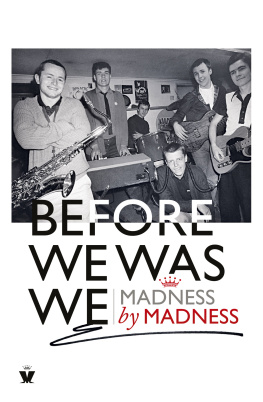Dyck Erika - Managing Madness
Here you can read online Dyck Erika - Managing Madness full text of the book (entire story) in english for free. Download pdf and epub, get meaning, cover and reviews about this ebook. year: 2017, publisher: University of Manitoba Press, genre: Politics. Description of the work, (preface) as well as reviews are available. Best literature library LitArk.com created for fans of good reading and offers a wide selection of genres:
Romance novel
Science fiction
Adventure
Detective
Science
History
Home and family
Prose
Art
Politics
Computer
Non-fiction
Religion
Business
Children
Humor
Choose a favorite category and find really read worthwhile books. Enjoy immersion in the world of imagination, feel the emotions of the characters or learn something new for yourself, make an fascinating discovery.
- Book:Managing Madness
- Author:
- Publisher:University of Manitoba Press
- Genre:
- Year:2017
- Rating:5 / 5
- Favourites:Add to favourites
- Your mark:
- 100
- 1
- 2
- 3
- 4
- 5
Managing Madness: summary, description and annotation
We offer to read an annotation, description, summary or preface (depends on what the author of the book "Managing Madness" wrote himself). If you haven't found the necessary information about the book — write in the comments, we will try to find it.
Managing Madness — read online for free the complete book (whole text) full work
Below is the text of the book, divided by pages. System saving the place of the last page read, allows you to conveniently read the book "Managing Madness" online for free, without having to search again every time where you left off. Put a bookmark, and you can go to the page where you finished reading at any time.
Font size:
Interval:
Bookmark:

MANAGING madness
Weyburn Mental Hospital and the Transformation of Psychiatric Care in Canada
ERIKA DYCK AND ALEX DEIGHTON
With Hugh Lafave, John Elias, Gary Gerber, Alexander Dyck, John Mills, and Tracey Mitchell

Managing Madness: Weyburn Mental Hospital and the Transformation of Psychiatric Care in Canada
Erika Dyck and Alex Deighton 2017
21 20 19 18 17 1 2 3 4 5
All rights reserved. No part of this publication may be reproduced or transmitted in any form or by any means, or stored in a database and retrieval system in Canada, without the prior written permission of the publisher, or, in the case of photocopying or any other reprographic copying, a licence from Access Copyright, www.accesscopyright.ca, 1-800-893-5777.
University of Manitoba Press
Winnipeg, Manitoba, Canada
Treaty 1 Territory
uofmpress.ca
Cataloguing data available from Library and Archives Canada
ISBN 978-0-88755-795-8 (paper)
ISBN 978-0-88755-537-4 (pdf)
ISBN 978-0-88755-535-0 (epub)
Cover design by Frank Reimer
Interior design by Jess Koroscil
Cover image: Weyburn Mental Hospital Michael Kesterton
Printed in Canada
This book has been published with the help of a grant from the Federation for the Humanities and Social Sciences, through the Awards to Scholarly Publications Program, using funds provided by the Social Sciences and Humanities Research Council of Canada.
The University of Manitoba Press acknowledges the financial support for its publication program provided by the Government of Canada through the Canada Book Fund, the Canada Council for the Arts, the Manitoba Department of Sport, Culture, and Heritage, the Manitoba Arts Council, and the Manitoba Book Publishing Tax Credit.
Dedicated to everyone who has encountered madness
CONTENTS
LIST OF ILLUSTRATIONS
NOTE ON PHOTOGRAPHS
The images in this book are a small sampling of the hundreds of photographs depicting the Weyburn Mental Hospital and the people whose lives intersected with the institution. The photographs include some from the hospitals early days of construction and its first few decades of operation, courtesy of the Soo Line Museum. Others come from an unpublished set of photographs taken by Michael Kesteron in 1953, which he had intended to publish after visiting Weyburn on assignment from Macleans magazine. Other photographs were kept by staff working in mental health services in the 1970s and remain undated and uncatalogued. The most recent photographs depict the closing of the hospital and ultimately its destruction; we are grateful to Penny Dyck and Kam Theo for capturing these moments to help bookend the rise and fall of this important facility.
appear at the end of this book.
ACKNOWLEDGEMENTS
We want to begin by acknowledging the Treaty 4 territory where the Weyburn Mental Hospital once stood and where this book unfolded. This book is the product of the inspiration, reflection, collaboration, and ultimately hard work of many people who have all encountered the mental health system in different ways. We all have our reasons for getting involved in writing the book, and we all have different people and experiences to thank for that motivation. What initially began as a more modest proposal from Hugh Lafave to write up a little something on the remarkable experiment(s) that unfolded in Saskatchewan gradually grew in scope, and we quickly realized that the strength of our venture multiplied as we joined with others who helped to nuance and enrich the discussion.
After several telephone calls, and a few visits to Ontario, Hugh introduced me, Erika Dyck, to Gary Gerber, and our circle widened. We started by applying to the Saskatchewan Health Research Foundation for a new investigator grant to support the hiring and training of an archivist who could take the newly deposited patient admission records and enter them into a database, which we could then read, compare, and analyze to tease out patient experiences in the first half of the twentieth century.
Alex Deighton took a course on the history of madness with me and the following summer volunteered to work in the archives retracing the earlier history of the hospital. After many weeks reviewing institutional materials and government records, he began writing up his impressions, and it was clear that he was going to be an integral part of the team because of his sophisticated research and sensitive analysis. Ultimately, Alex took the lead on Chapters 1 to 3.
Alex Dyck was a medical student at the University of Saskatchewan when he approached me about doing a summer research project. We applied for funding from Associated Medical Services and received a student internship grant for Alex to compare diagnostic categories over time and through different nascent systems of classification.
Along the way, I met John Mills through correspondence and ultimately collaborated with him on a paper. John was working on his own manuscript about the history of psychiatry in Saskatchewan. Before he completed it, however, he fell ill and passed it along to the team, allowing us to use parts of it for our own purposes. Working with his widow, Ann Newdigate, and his son, Julian Mills, we have woven together parts of Johns work along with much of the passion and insight of his original manuscript.
John Elias joined us later in the process but played a critical role in locating unarchived documents, many of which were in his possession after he served many years in the Saskatchewan government and was responsible for revising the Mental Health Services Act after introduction of the Canadian Charter of Rights and Freedoms. Without his organization, interest in, and passion for this subject, much of the material for the latter half of the book would not have been possible.
Tracey Mitchell and I had long shared interests in progressive Saskatchewan politics and survivor politics, but the evolving nature of this project allowed us to come together again and put our words on paper as we worked through some of our convictions about social justice and madness within a historically contingent framework.
I am deeply indebted to each of these authors for sharing his or her passion, experiences, inspiration, and ideas. I am proud that we were able to work together and make this a collaborative project, and the sum of our parts constituted a much stronger book in the end.
We have many others who helped us along the way to thank as well. We received financial support from the Saskatchewan Health Research Foundation, the Canada Research Chair funds, Associated Medical Services, Inc., and the University of Saskatchewan. We benefited from the technical support of the Digital Research Centre and its guru, Jon Bath. My colleague Geoff Cunfer not only encouraged us to embrace Historical Geographic Information Systems methods but also introduced me to his technician, Mike St. Louis, who helped us to clean the data and prepare the charts and maps in this book. The Saskatchewan Archives Board, renamed the Provincial Archives of Saskatchewan as the book neared completion, was instrumental in developing the database that allowed us to compare patient admissions across institutions. Anna Stoszek, Liam Currie, and Lisa Long were indispensable for negotiating the legal, ethical, and archival contours of creating this resource, and we hope that it will provide a rich dataset for future researchers as well. Alexandre Pelletier at the University of Ottawa joined us at our Ontario meetings and interviewed Hugh Lafave repeatedly to capture his detailed reflections.
Font size:
Interval:
Bookmark:
Similar books «Managing Madness»
Look at similar books to Managing Madness. We have selected literature similar in name and meaning in the hope of providing readers with more options to find new, interesting, not yet read works.
Discussion, reviews of the book Managing Madness and just readers' own opinions. Leave your comments, write what you think about the work, its meaning or the main characters. Specify what exactly you liked and what you didn't like, and why you think so.











